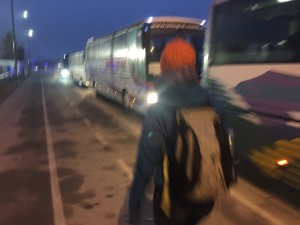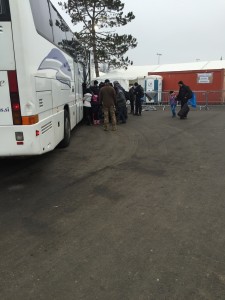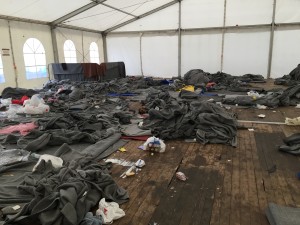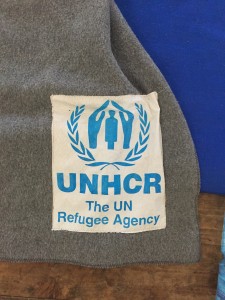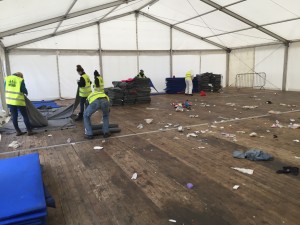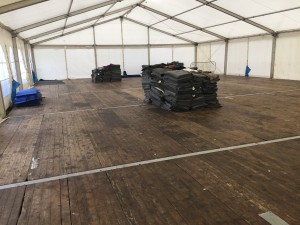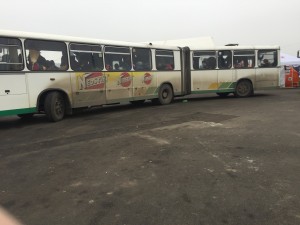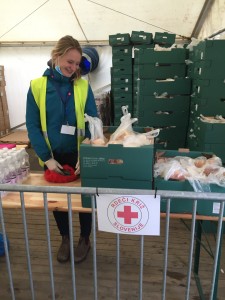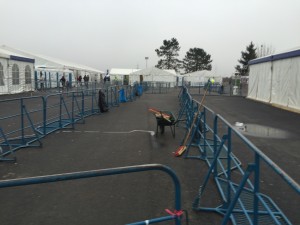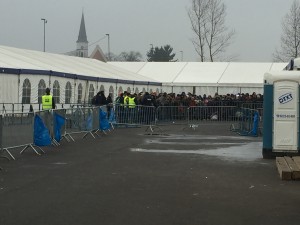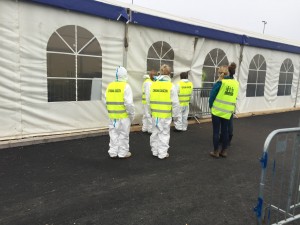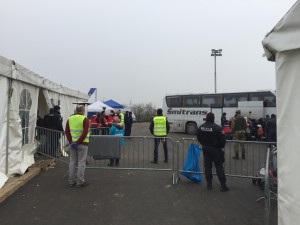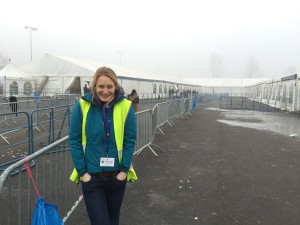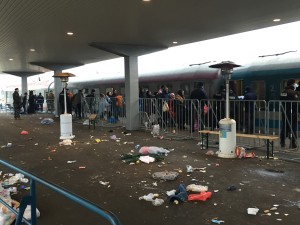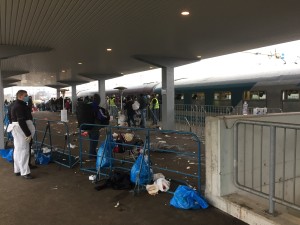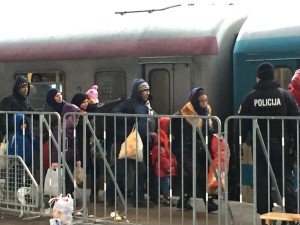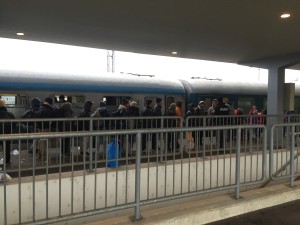My girlfriend, Em, and I spent the past two days volunteering at a refugee camp in southern Slovenia. It was insightful. Read about our experience and observations.
During four months of living and traveling in central and eastern Europe we had shared many conversations about the migrant ‘crisis’, caught glimpses of asylum-seekers’ movements and read countless articles about the ins-and-outs of the migration phenomenon. However, we had yet to engage with anything first-hand. Lingering questions and uncertainty always seemed to trump facts.
So, before we flew home to celebrate Christmas in safe, warm homes with complete families, we sought an opportunity to aide those in need entering Europe.
After a couple hours of web-surfing, we concluded that Slovenska Filantropja, a Slovenian charity organization, offered the best opportunity for us to contribute on the ground in a meaningful way. We applied to volunteer for two ‘shifts’ at a camp in Sentilj, Slovenia.
After some email exchange with a coordinator, we learned that the Sentilj camp was largely dormant but that our enthusiasm could put to work at Dobova.
Although Dobova was significantly further afield of adopted home in Graz, Austria, we were committed to the idea and agreed to spend two days helping at the camp.
On Thursday evening we set off. The train connections were smooth and we arrived in Krsko, Slovenia at 22:00. We spent the night in a seemingly-vacant youth hostel in the tiny town.
Shortly before 6 am on Friday we rose, and took the train a quarter hour south east to Dobova – near the border with Croatia. The camp is located less than a kilometer from the train station and impossible to miss. The early morning fog was eerie. As we approached, idling buses filled with sleeping people lined the highway. We navigated the camp entrance, past small groups of Slovenian police and army huddled around heat lamps, to the volunteer tent. Nikolaj, the ever-energetic volunteer coordinator welcomed us with Turkish coffee. We were off to a great start.
We met a few of the other volunteers and received a brief tour of the camp – food distribution area and a documents-processing tent. Most details of how the day might unfold however remained to our imagination. With the group we grabbed brooms and shovels. We began cleaning a tent. Empty buses had begun to arrive. Tall, blonde Slovenian police beckoned migrants to file onto the bus.
Once the second of three resting tents was fully vacated, our mini army of clean-up volunteers entered the room. The task was to fold the hundreds of blankets strewn on the floor amid garbage, food waste and discarded personal belongings. Once the piles were stacked we rid the floor of all remaining refuse. It was not the most pleasant, however we signed up to help in any way that we could and this was what needed doing.
After cleaning an organizing we took a short break before the first wave of migrants of the day arrived from Croatia. As the first bus drove up our group of volunteers assembled in the food distribution tent.
As volunteers we were to guide the migrants to complete the following:
- Debark the bus
- File through the food tent and receive a bag with two pieces of white bread, some spread, and an apple. File further along and select what they wanted among choices of cheese, water, canned sardines, milk and a second apple.
- Continue along to queue in a heated waiting tent.
- Then through the security tent where they would be searched by police. At this point all forbidden items were discarded – nail clippers, razors, knives, lighters, etc.
- Then into the registration tent to get registered and
- Then into the rest tent to wait until they would get on another bus and sent onward to Austria.
As you can likely gather the main purpose of the Dobova camp is to properly register migrants as having entered EU territory. Although almost all would have transited Greece, it is well-known that registration facilities there are as effective as their tax collectors.
The rest our volunteer shift was spent interacting with migrants and helping in whatever ways we could, cleaning vacant tents and refreshing the food bag inventory.
Only ~600 people had arrived that morning. It was a tiny day.
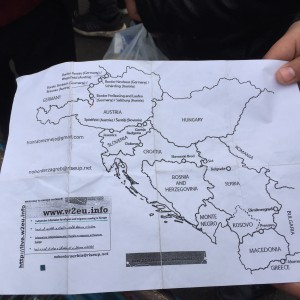
Some Afghani guys had this map. It was the first one I had seen like it. The marked dots are the transit points/camps. They asked me were they where currently and where they were going.
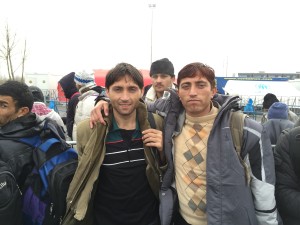
More Afghanis
Around 15:00 our shift was over. We cleaned up, packed up, bid farewell and walked to the Dobova train station. We weren’t the only ones waiting to depart. We learned that in some circumstances the buses only took the people from the camp to the train a kilometre down the road. From there, the train would carry them to Austria. More lining up, more slow trudging, more enduring of policeman yelling.
My most special interaction
During the morning break I wandered to the tent occupied by migrants who had spent the night. There was some children playing outside and men milling about. I approached two young guys chatting near a railing. I smiled and said ‘Hello’. One in particular spoke enough English to communicate decently. I asked questions. He willingly responded. They were Hazaras, originally from the Kunduz region in central Afghanistan, but who had been living in Bandar Abbas for as long as they could remember. One, the twenty-four year old with decent English, was traveling with his father and wife. His brother and another family member had preceded them months earlier.
They explained the persecution they had suffered in Iran and the future they hoped to build in Europe. I listened nodding my head softly.
During previous travels in the Middle East I had come in contact with Hazara people on multiple occasions. As a result I was familiar with their distinct features and aware of their tragic plight.
I shared two stories of encounters with Hazara people – one at an Iranian visa office in Shiraz, Iran, not so far from their home in Bandar Abbas and a second, of commissioning a Shalwar Khameez in the Hazara bazaar, in Quetta, Pakistan.
At this point a third man perked his ears. He was from Quetta. I smiled. He described the bazaar before asking where I had stayed while in the Balouchi capital. “Near the train station” I replied, not remembering the name of the guesthouse. “Ah, on Jinnah Road?” he offered. “Yes” I exclaimed as a flood of emotive visuals charged into my mind – the stern date sellers hawking from behind broken down carts, the randomly located sand-bag fortifications that signalled a city under silent siege, the feeling that the hardened eyes of each passer-by could peer deep into my soul from under their full-face wrap. I will never forget walking down Jinnah Road.
Soon, we wrapped up the conversation. We wished each other luck. I bounded back to the volunteer tent charged with energy.
You can read more about my time in Quetta and the Hazara people click here.
Some general observations/learnings
- Decline in volume – The number of migrants taking the ‘Balkan Route’ from the Middle East to Europe has substantially slowed recently. Whereas southern Slovenia was being inundated by the arrival of 9 000 – 12 000 migrants per day in September and October, now it ranges from 1 000 – 3 000 people per day.
- Shifting composition – The origins of the migrants are diverse and the composition is changing. Based on chats with interpreters and charity coordinators at the camp, in September and October Syrian refugees comprised a majority of the arrivals with Iraqi and Afghanis the minority. Now, there are more Afghans and Iraqis than Syrians passing through. As always there are a small number of ‘others’ – Moroccans, Somalis, Eritreans, etc.
- On demographic – Based on pure subjective observation, young, solo men seem to comprise ~ 55-65% of the group. Families the rest.
- Well-organized – The systems for transportation, registration, food distribution, medical services and shelter provision are well-established in Dobova. Interpreters and coordinators said that when thousands of migrants first began arriving the facility was very basic and largely ill-equipped. Since then they have poured a concrete foundation for the compound, established a logical lay-out of tents and seem to have the personnel required to calmly move people through.
- Police and army run the show – The humanitarian organizations fill in the gaps. In Slovenia at least, the influx of migrants is very-much treated as a national security issue and the provision of safe passage seems to be an ancillary concern.
- Germany is the desired destination – The majority of people I asked cited ‘Germany’ as their choice new home. That said there were lots who wished to end up in Sweden, Belgium and Netherlands. Only one expressed intention to get to Canada.
- Germany feeling saturated? – There was testimony from one volunteer interpreter who said that some German police had recently joined the security effort in Slovenia. This is normal. There were also Hungarian police around and helping. What is remarkable however is that some of the German police would go to the train station when migrants were boarding the train to Austria in attempt to dissuade groups from pursuing their German dream. Statements like ‘Why do you want to go to Germany? We are full’. ‘Go somewhere else. Why don’t you choose Sweden or Holland.’ Again, I didn’t experience this directly, but if it is true then it is an interesting development.
- Why not Slovenia? According to an European Commission employee who was also volunteering ,only 126 refugees among the hundreds of thousands who have passed through the country have applied for asylum in Slovenia to date. Interesting that almost no one considers staying…
Some useful links + additional information
- Great updates on humanitarian situation in eastern Europe
- Interactive map of refugee movements in Europe
- How Canada plans to help Syrian refugees
- The international definition of ‘Refugee’
- How ISIS sells oil and finances its activities
Note: For this post I borrow the BBC definition of ‘migrant’. So, like the BBC, I use the term migrant to refer to all people on the move who have yet to complete the legal process of claiming asylum. This group includes people fleeing war-torn countries such as Syria, who are likely to be granted refugee status, as well as people who are seeking jobs and better lives, who governments are likely to rule are economic migrants. Further, I use the terms ‘migrant’ and ‘refugee’ and ‘asylum-seeker’ interchangeably.



